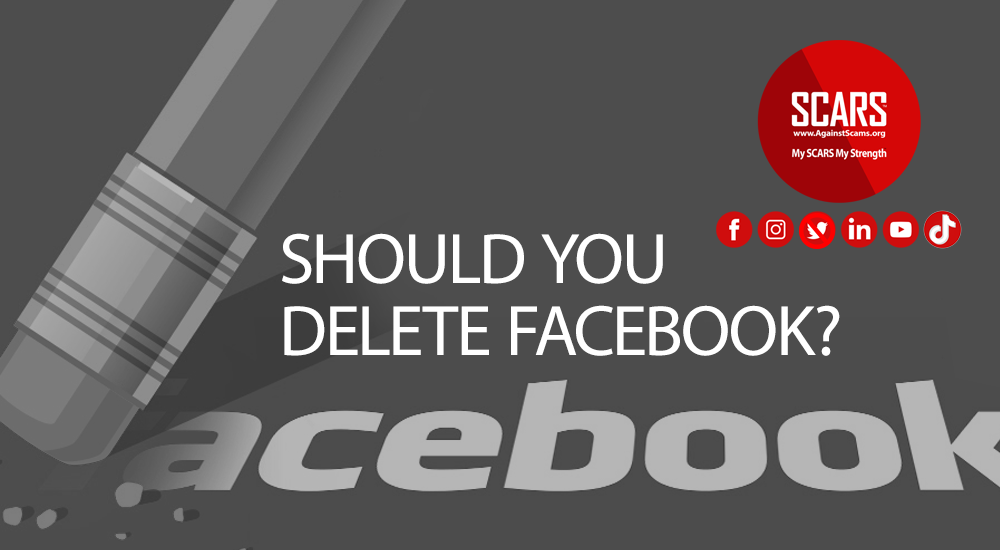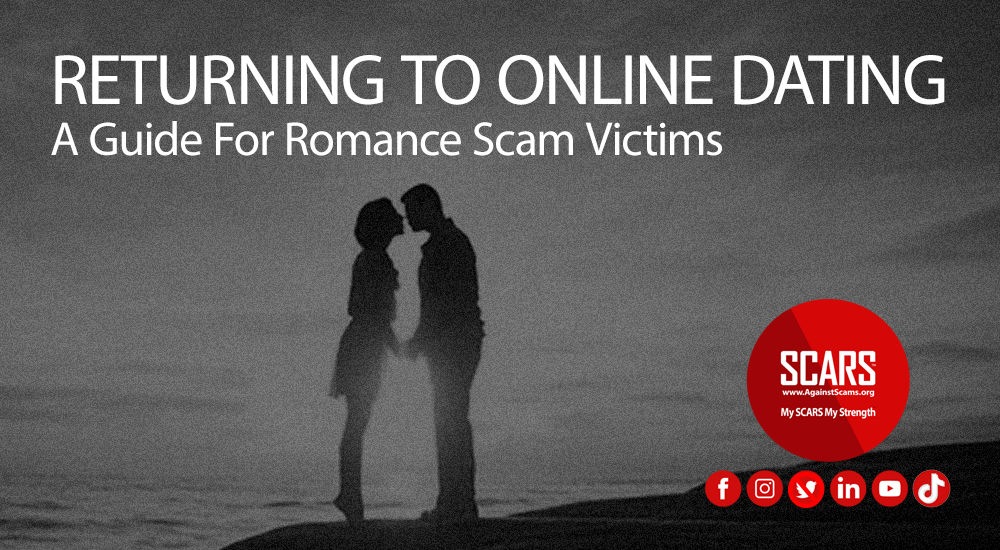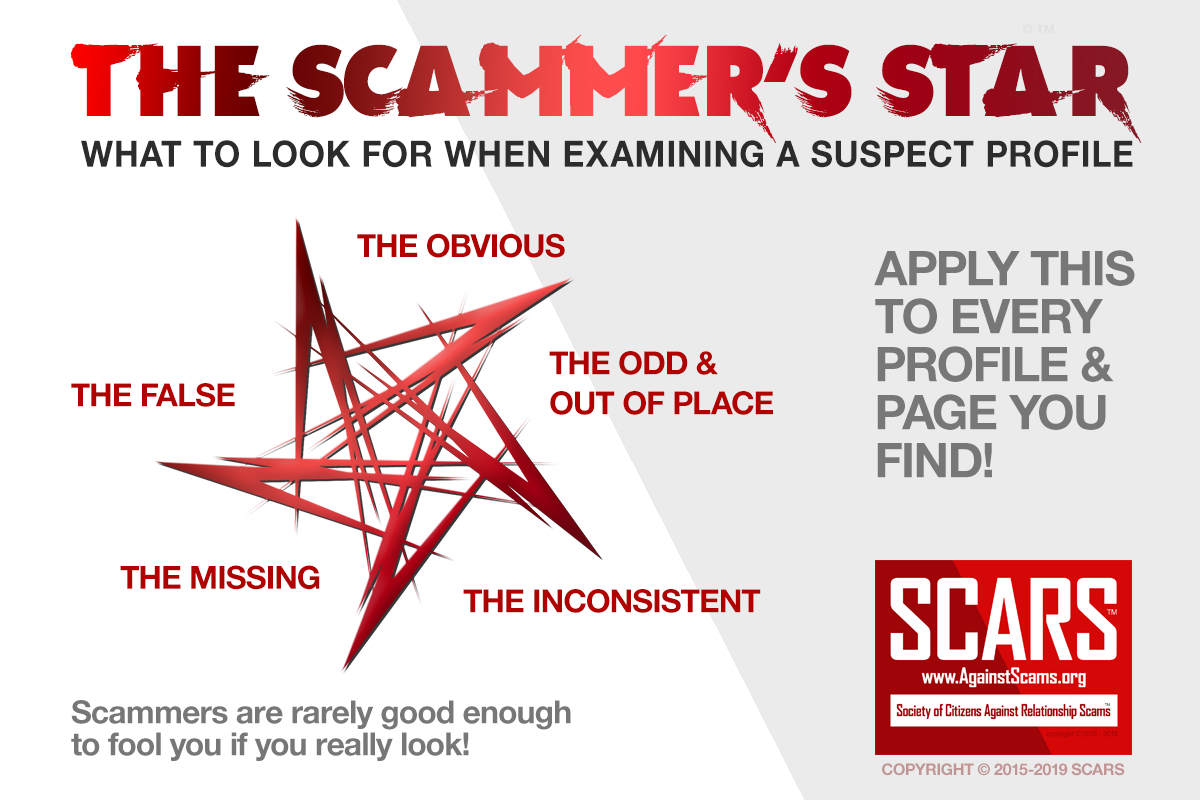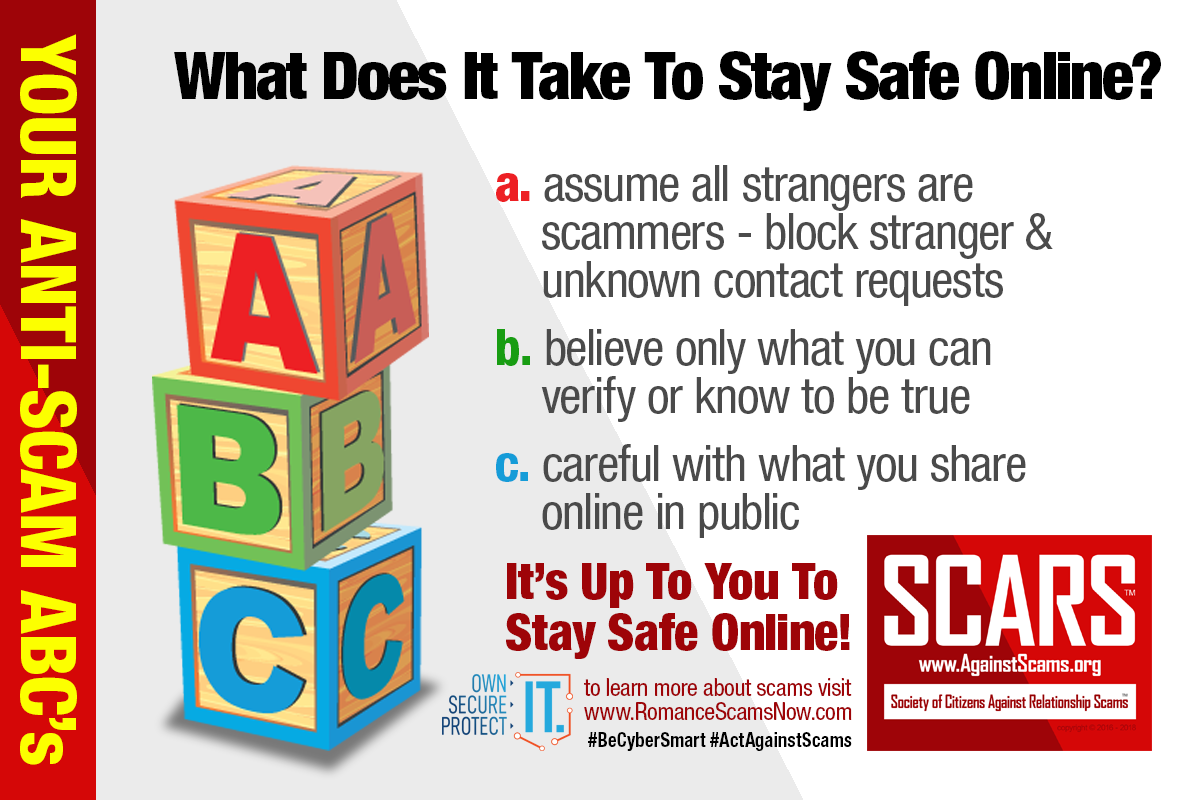
SCARS Institute’s Encyclopedia of Scams™ Published Continuously for 25 Years

Why Do The Same Thing Again And Expect Different Results?
Is this the definition of insanity? Or is it getting back on the horse after falling off?
Let’s explore the deeper meaning of dating, and why you might do it?
Let’s Review
Maybe your romance scam lasted a few days or a couple of years. One thing is for sure, it left its mark on you.
Victims who were emotionally attached to their fake relationship will be traumatized when they discover the truth. This is a normal part of the romance scam life cycle.
You will experience all the stages of grief – even if you don’t think that you did. You may also experience addictive withdrawal depending on the length and depth of the scam experience. These are real, not just some words on a screen. The failure to recognize trauma can lead to full PTSD and a lifetime of issues. We say this, not to blame you, but so you will get the help that you need.
Some victims will have encountered their scammers through social media, online gaming, or through dedicated dating websites or services.
The first thing you have to recognize is that scammers are everywhere. On Facebook, it is estimated that 50% of Facebook profiles are fake. On dating websites, it can be from 20% to as high as 70-80% are fake. The reason is the U.S. Law the Communications Decency Act Section 230 – which gives these businesses immunity from liability, as long as they turn a blind eye to the problem.
Knowing that why would you go back to the same places where you were scammed?
Returning to Online Dating
The first question you have to ask yourself is how did you decide to return to online dating?
- Did you really think about it and the potential consequences?
- Did you ask if you were ready for the process again?
- Did you ask yourself if you are emotionally stable to be able to trust someone again?
- Did you ask yourself if you are actually able to develop an attachment with someone again?
These are serious questions, and if you did not spend real time thinking about them, then clearly you are not ready!
After the stress & trauma of going through a romance scam, it should be difficult to think about dating again
Everyone has their own timeline for when they might want to get out there again. For some, the answer will be “NEVER AGAIN.” And that is a safe answer.
For others, there are deeper issues that have to be confronted. Such as, why are you afraid to be alone? Or, why do you feel compelled to trying another high-risk behavior?
More important than the length of time since your scam ended is what you have been doing during that time? It’s important to be self-reflective and mourn the loss, as well as learn what one can do better next time to avoid scams.
However, know this: You will not be able to avoid scams & scammers!
You are walking back in with the lions and expecting not to get bit this time. Is this a realistic expectation or just more or the same kind of fantasy as last time? We can’t answer that for you, only you and your conscience can answer that. We can only help you raise the right questions.
You Are Going To Do It Regardless!
And to ignore what others say about it, right?
Ok, you are an adult and you can make the same mistakes again and again, or even new mistakes. This is your right. So now what?
1. Wait Until You Are Reasonably Recovered Before You Start Dating
Even if you know your trauma is over, truly over, you still need to give yourself some time and space.
Although there’s no magic time frame by which one is ready to date, many psychologists recommend that you wait about a year.
Recovery from your scam is an emotionally draining time. Trauma needs time to heal – that is assuming you are working at it. It might be tempting to lick your wounds with positive attention from another, but this distraction can actually inhibit you from the healing work that is necessary to move forward in a healthy way with someone in the future.
2. Ask If You’re Dating Again For The Right Reasons
If the ‘why’ is to avoid painful feelings like hurt, anger, or loneliness, then it may be helpful to take some more time to heal before jumping back into dating,
If the ‘why’ is because you have taken time to heal, you now want to date more than you feel like you need to date, and you’re willing to feel all the emotions involved in dating again, then it may be a good sign that you’re ready. But ask your friends and family what they think too – they may be better at seeing your true emotional state than you are.
Dating requires a certain amount of vulnerability, tolerance of uncertainty, and willingness to feel a range of emotions in the hopes of making positive new connections and relationships. Can you really do that after your scam? Maybe, maybe not!
3. Setting Reasonable Expectations
You don’t have to enter into a date assuming you’ll get a real relationship or it will lead to something permanent.
Instead, you can look at it as an experience to learn more about your (new) self and the new life you’re creating for yourself moving forward after your romance scam.
It is possible that your first relationship post-scam might not be a rebound, but there are a lot of ‘ifs’ that go along with that. You need to be very sure that you are not rebounding which can lead to a deepening of your originals cam trauma and more serious mental health issues.
PLEASE NOTE: We strongly recommend that all scam victims talk with a trauma counselor or therapist before returning to online dating. Getting a real assessment of your present mental & emotional status is vital before placing yourself at risk again.
The mistake that many scam victims make in this post-scam relationship is thinking this new relationship won’t have its own challenges, its own issues, its own risks.
Another big mistake is comparing a new person to past relationships, even a fake scam relationship.
Many scam victims are divorced or widowed, and these leave their mark as well, and there may be unresolved issues from those past relationships. For example, thinking that if you correct the things the previous spouse complained about, then this new relationship will be happy.
The first relationship post-scam can last, provided you have learned about yourself and the issues of your past marriage or relationships. However, more likely the first relationship post scam is going to be a dumpster fire with tremendous issues of trust and confidence. Either way, you are the one to make the decision.
4. Be Honest About Your Past & Your Scam
Don’t be misleading about yourself, your life, or your interests (or kids!) in an online profile or in person. Eventually, the truth will come out, and you don’t want to have wasted your time or efforts. But more importantly, you want to find someone who shares your values, and who will like you for who you are.
What does this mean to a scam victim?
It means that you will also need to be honest about the scam experience, the trauma, and the emotional issues that were produced by it. In this new relationship, for it to succeed, you will need to make yourself emotionally available and vulnerable again – but do not do it too early – but when you do, be fully open and honest about it. Either the new person will be able to accept that you went through this experience or they will not.
5. Go Slow At First – So Slow Paint Drying Looks Like A Formula One Race!
You don’t have to dive head-first into an intense one-on-one relationship from day one. In fact, if you are tempted to do that, then clearly you are not ready to be dating yet!
You need to recognize the extent of your emotional damage from the scam. You need to recognize that you may simply need someone to talk to, but online dating is not the place for that – a support group or counselor is the place for that.
6. Make Sure That You Are Not Repeating The Past Mistakes
Make sure you are not staying online for very long. Switch to the phone and really talk quickly. Spend most of the time on the phone or real video chats, not online chatting where it could easily be another scammer! And verify everything!
Make sure it is someone local, so you can meet in person within a couple of weeks. Direct contact is essential to preventing the mistakes of the past. If you are not ready for that then do not go back into online dating.
Talk over the phone a lot and go on many dates that are different in type than what you may have done in the past. Different activities, opportunities to talk and get to know each other, opportunities to see a person in different settings. Some dates should involve each other’s friends, too. Remember, you have a LOT OF BAGGAGE that you need to overcome, and this is a way for working through that.
Just remember, you cannot go into another online relationship. There be dragons there!
7. Make Space For Your Feelings Come Out
Because they will, whether you want them to or not, and in ways you might not have expected.
You may feel guilty, nervous, or excited. Whatever your emotions are that dating stirs up for you is okay. Except if it is fear.
Allow yourself to experience a wide range of emotions. It is hard to get out there again, but whether you’re doing better than you think or worse, give yourself a break, too. Be patient and compassionate with yourself and with the process. Pay attention to your intuition, but do not rely on it only – that did not work out so well the last time. Remember that it is normal to have wants and needs, and you deserve to be happy.
8. Know Your Priorities
Figure out what you’re looking for in a partner.
- What are your unacceptable conditions?
- What are the values you’re most looking for?
- How will you verify the truth this time?
- Are you prepared to be vulnerable and honest?
- Are you prepared for it to fail?
Figuring that out first will save you from wasting time with someone who isn’t going to be a good match in the long run.
9. Be Informed About Online Dating
Your romance scam may not have come through online dating the first time, so you may not know a lot about it. But you must know, you are going to see a lot of scammers and fakes.
Some dating sites are better than others, but they all have fakes. Do not just pick a free website, do research into which ones offer the experience you’re looking for: some are better suited to those looking for long-term partners, and others are more for casual dating.
We suggest asking a simple but very loaded question right up front: “How do I know you are not fake and a scammer?”
Getting the answer to that will tell you a huge amount about the other person:
- Too much protesting is probably a bad sign.
- Impatience means they will probably not be a good fit when you share your experience.
- A real person will be realistic and begin to explore ways to verify each other.
10. Don’t Rush To Share Too Much Information
Remember, you were not so good at detecting a scam the first time. Assume there is every possibility it is a scam until you actually meet the person.
Do not share friends, family, and employment early. Verify verify verify before giving too much information about yourself!
As a rule of thumb, spend at least 6 months getting to know someone before you introduce them to your family.
11. Keep Growing – Keep Recovering
Dating is going to require effort on your part, even in the easiest coupling. But remember that you have a resource to help you – your scam support group – use it!
As you start dating, rely on your peers to help you understand what is happening in your head. This may not a topic for the group, but there are people you will have become friends with that you can ask to review your decisions and actions.
Also, no relationship is perfect and the ones that last take work! Be in recovery and increase your self-awareness as you participate in the dating process. Heal yourself so you attract healthy people!
12. Above All Else, Trust Yourself
This is the hard part, because how much can you trust yourself?
We can’t answer that, only you can. Obviously, that last time was not a success. Did people tell you it was a scam, and did you listen? Probably not. Have you learned that lesson fully? Probably not.
So how can you trust what you think and do?
- If you have a bad feeling about someone, move on. Remember, dating is interviewing people for a job! Don’t be afraid to end a date or stop dating someone if you sense a ‘red flag.’ Beware of the person who blames their ex for everything. It is better to be safe, rather than sorry!
- If you feel you are not ready, then stop, do not feel like you have to continue with a person or with dating at all. You can put it on pause for a few months and come back later. There is no shame in this.
- Continue with your recovery while all this is going on. This will help you stay centered and not lose yourself in another rapid relationship. Take your time.
- Do not be impulsive. Never let yourself respond to impulsive decisions. If you are asked to do something, take a day or two to think about it – make this your default behavior.
13. Select The Right Dating Site
In truth all dating sites seem to have scammers, so you must always be on guard. However, at a minimum look for these attributes when selecting a dating website:
- Never go with a free website – it will be mostly scammers – even free trials are dangerous.
- Do your research and chose a site based on real reviews and success stories.
- Make sure the site used psychological profiling. Scammers may still pay people to fill in the profiles, but it does reduce the chance of encountering a scammer from total certainty to around 50/50.
- Look carefully at every profile – the devil is in the details – use our SCARS Scammer’s Star as a guide (see below)
- Always ask reinforcing verification questions when you are beginning to chat for the first couple of weeks until you meet the person.
- Ask about local knowledge and verify on Google.
- Ask the question upfront: “How do I know you are not fake and a scammer?”
- Make sure you know how to report profiles on that site – if they make it hard, then do not trust the site.
- Keep a journal, don’t trust your memory – trauma messes with your memory.
- Please be careful!
Summary
If you have been paying attention, then you know most of the scammer’s red flags, but red flags alone are not enough.
You will be open to being scammed again unless you are very careful.
The trick is the balance of caution and vulnerability that you will need to be open to a new relationship. But time is your great ally. Trust time. If after a few days of thinking about something, if it still seems safe then you can trust it and yourself, just go slow. During the scam you were a Cheata, no you are a Snail!
We hope you learned what you need to know, and we hope you have a wonderful life!
We wish you all the best!
More:
- Abstinence for Scam Victims – A Requirement For Healing (scamsnow.com)
- Magical Thinking – How Biased & Delusional Thinking Enslaves Scam Victims (scamsnow.com)
- What Really Are Vulnerabilities That Lead To Scams? (scamsnow.com)
- Optimism Bias – Everything Will Be Fine (romancescamsnow.com)
- Recovery from Scams – Article Catalog (romancescamsnow.com)
- Scam Victim Suicides Are Up – New Data Hints (scamsnow.com)
- Projection And Scam Victims (scamsnow.com)
Statement About Victim Blaming
SCARS Institute articles examine different aspects of the scam victim experience, as well as those who may have been secondary victims. This work focuses on understanding victimization through the science of victimology, including common psychological and behavioral responses. The purpose is to help victims and survivors understand why these crimes occurred, reduce shame and self-blame, strengthen recovery programs and victim opportunities, and lower the risk of future victimization.
At times, these discussions may sound uncomfortable, overwhelming, or may be mistaken for blame. They are not. Scam victims are never blamed. Our goal is to explain the mechanisms of deception and the human responses that scammers exploit, and the processes that occur after the scam ends, so victims can better understand what happened to them and why it felt convincing at the time, and what the path looks like going forward.
Articles that address the psychology, neurology, physiology, and other characteristics of scams and the victim experience recognize that all people share cognitive and emotional traits that can be manipulated under the right conditions. These characteristics are not flaws. They are normal human functions that criminals deliberately exploit. Victims typically have little awareness of these mechanisms while a scam is unfolding and a very limited ability to control them. Awareness often comes only after the harm has occurred.
By explaining these processes, these articles help victims make sense of their experiences, understand common post-scam reactions, and identify ways to protect themselves moving forward. This knowledge supports recovery by replacing confusion and self-blame with clarity, context, and self-compassion.
Additional educational material on these topics is available at ScamPsychology.org – ScamsNOW.com and other SCARS Institute websites.
-/ 30 /-
What do you think about this?
Please share your thoughts in a comment below!
Table of Contents
- After A Bad Experience, Many Victims Return To Online Dating Expecting Different Results
- Why Do The Same Thing Again And Expect Different Results?
- Is this the definition of insanity? Or is it getting back on the horse after falling off?
- Let’s Review
- Returning to Online Dating
- You Are Going To Do It Regardless!
- 1. Wait Until You Are Reasonably Recovered Before You Start Dating
- 2. Ask If You’re Dating Again For The Right Reasons
- 3. Setting Reasonable Expectations
- 4. Be Honest About Your Past & Your Scam
- 5. Go Slow At First – So Slow Paint Drying Looks Like A Formula One Race!
- 6. Make Sure That You Are Not Repeating The Past Mistakes
- 7. Make Space For Your Feelings Come Out
- 8. Know Your Priorities
- 9. Be Informed About Online Dating
- 10. Don’t Rush To Share Too Much Information
- 11. Keep Growing – Keep Recovering
- 12. Above All Else, Trust Yourself
- 13. Select The Right Dating Site
- Summary
- We wish you all the best!
- More:
LEAVE A COMMENT?
Recent Comments
On Other Articles
- Arwyn Lautenschlager on Love Bombing And How Romance Scam Victims Are Forced To Feel: “I was love bombed to the point that I would do just about anything for the scammer(s). I was told…” Feb 11, 14:24
- on Dani Daniels (Kira Lee Orsag): Another Scammer’s Favorite: “You provide a valuable service! I wish more people knew about it!” Feb 10, 15:05
- on Danielle Delaunay/Danielle Genevieve – Stolen Identity/Stolen Photos – Impersonation Victim UPDATED 2024: “We highly recommend that you simply turn away form the scam and scammers, and focus on the development of a…” Feb 4, 19:47
- on The Art Of Deception: The Fundamental Principals Of Successful Deceptions – 2024: “I experienced many of the deceptive tactics that romance scammers use. I was told various stories of hardship and why…” Feb 4, 15:27
- on Danielle Delaunay/Danielle Genevieve – Stolen Identity/Stolen Photos – Impersonation Victim UPDATED 2024: “Yes, I’m in that exact situation also. “Danielle” has seriously scammed me for 3 years now. “She” (he) doesn’t know…” Feb 4, 14:58
- on An Essay on Justice and Money Recovery – 2026: “you are so right I accidentally clicked on online justice I signed an agreement for 12k upfront but cd only…” Feb 3, 08:16
- on The SCARS Institute Top 50 Celebrity Impersonation Scams – 2025: “Quora has had visits from scammers pretending to be Keanu Reeves and Paul McCartney in 2025 and 2026.” Jan 27, 17:45
- on Scam Victims Should Limit Their Exposure To Scam News & Scammer Photos: “I used to look at scammers photos all the time; however, I don’t feel the need to do it anymore.…” Jan 26, 23:19
- on After A Scam, No One Can Tell You How You Will React: “This article was very informative, my scams happened 5 years ago; however, l do remember several of those emotions and/or…” Jan 23, 17:17
- on Situational Awareness and How Trauma Makes Scam Victims Less Safe – 2024: “I need to be more observant and I am practicing situational awareness. I’m saving this article to remind me of…” Jan 21, 22:55
ARTICLE META
Important Information for New Scam Victims
- Please visit www.ScamVictimsSupport.org – a SCARS Website for New Scam Victims & Sextortion Victims
- Enroll in FREE SCARS Scam Survivor’s School now at www.SCARSeducation.org
- Please visit www.ScamPsychology.org – to more fully understand the psychological concepts involved in scams and scam victim recovery
If you are looking for local trauma counselors please visit counseling.AgainstScams.org or join SCARS for our counseling/therapy benefit: membership.AgainstScams.org
If you need to speak with someone now, you can dial 988 or find phone numbers for crisis hotlines all around the world here: www.opencounseling.com/suicide-hotlines
A Note About Labeling!
We often use the term ‘scam victim’ in our articles, but this is a convenience to help those searching for information in search engines like Google. It is just a convenience and has no deeper meaning. If you have come through such an experience, YOU are a Survivor! It was not your fault. You are not alone! Axios!
A Question of Trust
At the SCARS Institute, we invite you to do your own research on the topics we speak about and publish, Our team investigates the subject being discussed, especially when it comes to understanding the scam victims-survivors experience. You can do Google searches but in many cases, you will have to wade through scientific papers and studies. However, remember that biases and perspectives matter and influence the outcome. Regardless, we encourage you to explore these topics as thoroughly as you can for your own awareness.
Statement About Victim Blaming
SCARS Institute articles examine different aspects of the scam victim experience, as well as those who may have been secondary victims. This work focuses on understanding victimization through the science of victimology, including common psychological and behavioral responses. The purpose is to help victims and survivors understand why these crimes occurred, reduce shame and self-blame, strengthen recovery programs and victim opportunities, and lower the risk of future victimization.
At times, these discussions may sound uncomfortable, overwhelming, or may be mistaken for blame. They are not. Scam victims are never blamed. Our goal is to explain the mechanisms of deception and the human responses that scammers exploit, and the processes that occur after the scam ends, so victims can better understand what happened to them and why it felt convincing at the time, and what the path looks like going forward.
Articles that address the psychology, neurology, physiology, and other characteristics of scams and the victim experience recognize that all people share cognitive and emotional traits that can be manipulated under the right conditions. These characteristics are not flaws. They are normal human functions that criminals deliberately exploit. Victims typically have little awareness of these mechanisms while a scam is unfolding and a very limited ability to control them. Awareness often comes only after the harm has occurred.
By explaining these processes, these articles help victims make sense of their experiences, understand common post-scam reactions, and identify ways to protect themselves moving forward. This knowledge supports recovery by replacing confusion and self-blame with clarity, context, and self-compassion.
Additional educational material on these topics is available at ScamPsychology.org – ScamsNOW.com and other SCARS Institute websites.
Psychology Disclaimer:
All articles about psychology and the human brain on this website are for information & education only
The information provided in this article is intended for educational and self-help purposes only and should not be construed as a substitute for professional therapy or counseling.
While any self-help techniques outlined herein may be beneficial for scam victims seeking to recover from their experience and move towards recovery, it is important to consult with a qualified mental health professional before initiating any course of action. Each individual’s experience and needs are unique, and what works for one person may not be suitable for another.
Additionally, any approach may not be appropriate for individuals with certain pre-existing mental health conditions or trauma histories. It is advisable to seek guidance from a licensed therapist or counselor who can provide personalized support, guidance, and treatment tailored to your specific needs.
If you are experiencing significant distress or emotional difficulties related to a scam or other traumatic event, please consult your doctor or mental health provider for appropriate care and support.
Also read our SCARS Institute Statement about Professional Care for Scam Victims – click here to go to our ScamsNOW.com website.


















Thank you for your comment. You may receive an email to follow up. We never share your data with marketers.